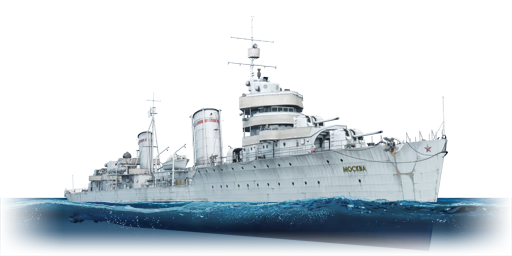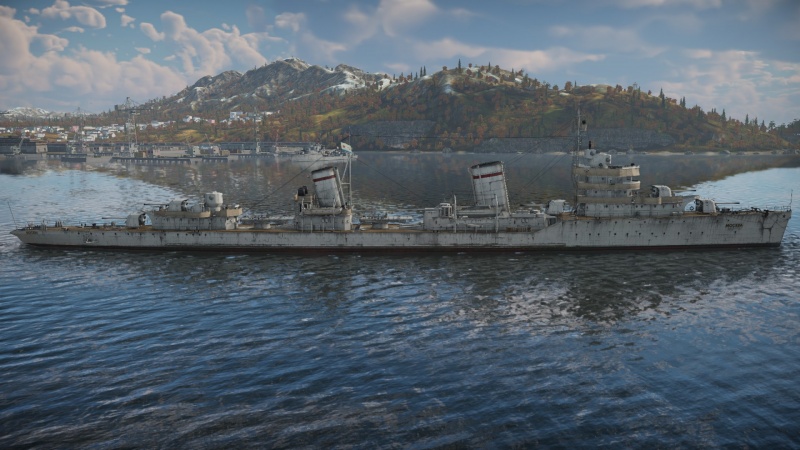Difference between revisions of "Moskva"
m (→Pros and cons) (Tag: Visual edit) |
Colok76286 (talk | contribs) (Edits) |
||
| Line 66: | Line 66: | ||
=== Pros and cons === | === Pros and cons === | ||
| + | <!-- ''Summarise and briefly evaluate the vehicle in terms of its characteristics and combat effectiveness. Mark its pros and cons in the bulleted list. Try not to use more than 6 points for each of the characteristics. Avoid using categorical definitions such as "bad", "good" and the like - use substitutions with softer forms such as "inadequate" and "effective".'' --> | ||
'''Pros:''' | '''Pros:''' | ||
| Line 71: | Line 72: | ||
* Large crew size makes it durable and hard to sink | * Large crew size makes it durable and hard to sink | ||
* Hard hitting main battery guns with great shell velocity | * Hard hitting main battery guns with great shell velocity | ||
| − | * Decent long-range AA | + | * Decent long-range AA defences |
'''Cons:''' | '''Cons:''' | ||
Revision as of 07:22, 9 April 2021
Contents
Description
The Leningrad-class, Moskva, 1941 is a rank II Soviet destroyer with a battle rating of 4.3 (AB/RB/SB). It was introduced in Update 1.85 "Supersonic". It is the first destroyer-leader in the game, second one being Tashkent.
General info
Survivability and armour
Talk about the vehicle's armour. Note the most well-defended and most vulnerable zones, e.g. the ammo magazine. Evaluate the composition of components and assemblies responsible for movement and manoeuvrability. Evaluate the survivability of the primary and secondary armaments separately. Don't forget to mention the size of the crew, which plays an important role in fleet mechanics. Save tips on preserving survivability for the "Usage in battles" section. If necessary, use a graphical template to show the most well-protected or most vulnerable points in the armour.
Mobility
Write about the ship's mobility. Evaluate its power and manoeuvrability, rudder rerouting speed, stopping speed at full tilt, with its maximum forward and reverse speed.
| Mobility Characteristics | |||
|---|---|---|---|
| Game Mode | Upgrade Status | Maximum Speed (km/h) | |
| Forward | Reverse | ||
| AB | |||
| Upgraded | 98 | 40 | |
| RB/SB | |||
| Upgraded | 80 | 32 | |
Modifications and economy
Armament
Primary armament
The Moskva carries five B-13 guns in single mountings. Of these, two are mounted ahead of the superstructure, two at the aft, and one gun is mounted in an inconvenient position behind the main superstructure but ahead of the funnels. Thus, the ship must expose its broadside to allow all guns to fire.
The B-13 cannon is shared by most WWII-era destroyers of the Soviet fleet, and is a very potent weapon. However, the main flaw with this weapon is its absolutely horrid turret rotation speed of 4.2 degrees / second vertically and horizontally. This means that you have to turn the turrets very early to be able to engage effectively. The guns themselves shoot accurately and have a high initial velocity (870 m/s compared to 790 m/s for the American 5"/38 guns). However, this comes at the expense of reload speed, as the manually-loaded weapons can only fire at 10 rounds per minute (RPM) with a spaded crew, compared to 22 RPM for the American 5"/38. In fact, this fire rate is slower than everything except for the Japanese and Italian 5" guns, which have a similar fire rate.
The guns themselves have access to three shell types: the OF-46 high-explosive (HE) shell, the PB-46A semi armour-piercing (SAPBC) shell, and the ZS-46R proximity-fuzed (HE-VT) shell. Of these weapons, the HE shell is usually the best against enemy destroyers and ships as it packs the most explosive filler, 3.58 kilograms of it to be exact. The SAPBC shell works better against the occasional cruiser you may encounter, as it packs more penetration capacity (up to 179 mm compared to 36 mm for the HE shell). Finally, the HE-VT shell is good against aircraft as it will explode when close enough to the enemy aircraft, meaning that it doesn't require a direct hit. However, it actually packs less explosive filler than the normal HE shell, which is unusual for any HE-VT shell. Combined with the horrible traverse rate, this means the guns aren't particularly suited for anti-aircraft duties.
Secondary armament
The Moskva carries two 76 mm 34-K mountings at the aft. The 34-K is also shared by most WWII-era Soviet ships, and gives you a potent secondary weapon that is of a relatively high calibre. This gun has a high fire rate of 27 rounds per minute (2.2-second reload), which can be decreased to 1.1 seconds with a full crew. The weapon itself is decent at closer ranges, but isn't a particularly effective anti-aircraft weapon as it inherits the extremely weak Soviet traverse rate. The single mountings themselves are only capable of traversing at 10 degrees per second, marginally faster than guns of cruiser calibre (6 inch+) of other nations.
The gun itself has access to three main shell types - the O-361K high-explosive (HE) shell, the O-361D time-fuzed (HE-TF) shell, and the BR-361 armour-piercing (APHEBC) shell. Of these rounds, the HE is almost always the best against enemy boats as it has the most explosive filler, and consequently, does the most damage. The HE-TF round is slightly worse as it detonates on a timed fuze, meaning the accuracy of the shell depends on crew skills. Finally, the APHEBC shells are rarely usable due to their low damage potential. For good measure, bring mostly HE, and a bit of HE-TF and APHEBC just in case the situation arises.
The Moskva also carries two 45 mm 21-K mountings beside the second forward gun, in front of the superstructure. The 21-K mounting is rather mediocre and performs far poorer than the smaller-calibre but faster firing 70-K 37 mm gun. These guns have an extremely similar reload sped to the 34-K, but pack much less punch. That said, these weapons are still quite effective against small ships and aircraft.
Anti-aircraft armament
The Moskva has a rather lacklustre anti-aircraft armament of eight 12.7 mm DShK machine guns. The 12.7 mm DShK machine gun is a heavy machine gun, similar to the M2 Browning used by the Americans and the Vickers guns used by the British. This gun fires from a fixed 50-round magazine and will need to be reloaded after the magazine is expended. The gun itself is rather mediocre, and will struggle to hit targets reliably at ranges exceeding 1.5 km. As well, the weapon doesn't do damage particularly well, considering that it is of a lower calibre. The Moskva does not get access to any ammunition belt upgrades - the default one is the only belt available.
Additional armament
The Moskva gets access to eight 53-38 torpedoes in two quad mounts, with no reloads. The 53-38 torpedo is also found on most other Soviet WWII-era destroyers, and is relatively mediocre as far as torpedoes go. In terms of damage-dealing capabilities, the torpedo is decidedly mediocre, having more explosive filler (300 kg of TNT) than the American torpedoes but less than the British and Japanese ones. However, the main drawback of the torpedo is it's range - without the "torpedo mode" modification, the 53-38s are restricted to a range of just 4 kilometres, meaning that they are tied for the shortest-range bluewater-ship mounted torpedoes along with the Italian destroyer torpedoes. The torpedo mode modification is necessary for hitting longer-ranged targets, but reduces the torpedo's speed to just 56 km/h. In general, these torpedoes are a potent weapon against enemy bluewater ships, but lack the range to do significant damage without the "torpedo mode" modification.
Usage in battles
As the name states, it is a destroyer leader, which invariably places the ship on the front line, but alternately, stay back far enough to shell the enemy. This ship can take a stand-off stance due to it having one of the strongest destroyer guns in the game. The secondary guns are useful, but expect mixed results depending on if you are engaging aircraft or other boats.
Pros and cons
Pros:
- Exceptionally fast, one of the fastest bluewater ships in the game
- Large crew size makes it durable and hard to sink
- Hard hitting main battery guns with great shell velocity
- Decent long-range AA defences
Cons:
- Large target - will draw fire from enemy team very quickly
- Average rate of fire from main guns
- Gun placement leads to inaccurate broadsides
- Torpedoes have a very short distance when stock, difficult to use unless very close to enemy
History
When the Russians observed the construction of the French Destroyer Leaders (contre-torpilleur), they realized that they need something to lead the newly build Project 7 and Project 7U destroyers. The result was the Leningrad-class of destroyers named after important Soviet cities, one of which was Moscow. Though the sea-worthiness of the ships were questionable, in the end, they got the job done.
There were other ships constructed as well:
- Leningrad (first ship in the class)
- Minks
- Kharkov
- Baku
- Tbilisi
Media
Excellent additions to the article would be video guides, screenshots from the game, and photos.
See also
Links to articles on the War Thunder Wiki that you think will be useful for the reader, for example:
- reference to the series of the ship;
- links to approximate analogues of other nations and research trees.
External links
Paste links to sources and external resources, such as:
- topic on the official game forum;
- other literature.
| USSR destroyers | |
|---|---|
| Imperial Russia | |
| Derzky-class | Frunze |
| Fidonisy-class | Kerch |
| Soviet Union | |
| Pr. 1 | Leningrad · Moskva |
| Pr. 45 | Opytny |
| Pr. 7 | Besposhchadny · Ryany |
| Pr. 7U | Soobrazitelny · Stroyny |
| Pr. 20 | Tashkent |
| Pr. 30 | Ognevoy |
| Pr. 30-bis | Smelyi · Bezuprechny |
| Pr. 41 | Neustrashimy |
| Pr. 56 | Spokoinyy · Blagorodnyy · Bravy |
| Trophies | Romania |
| Regele Ferdinand-class | Letuchiy |





